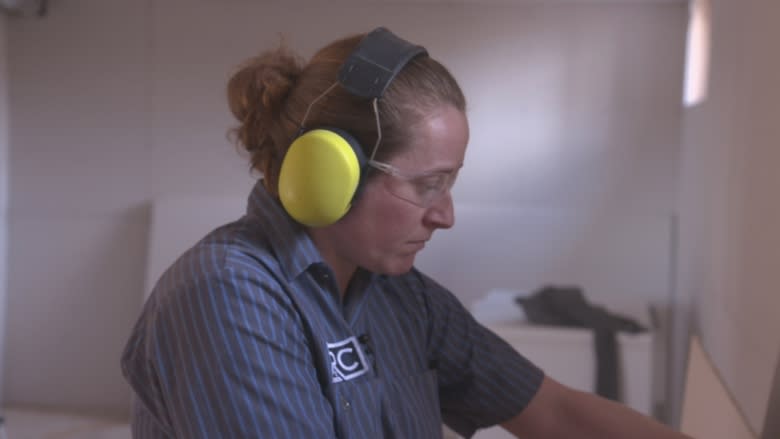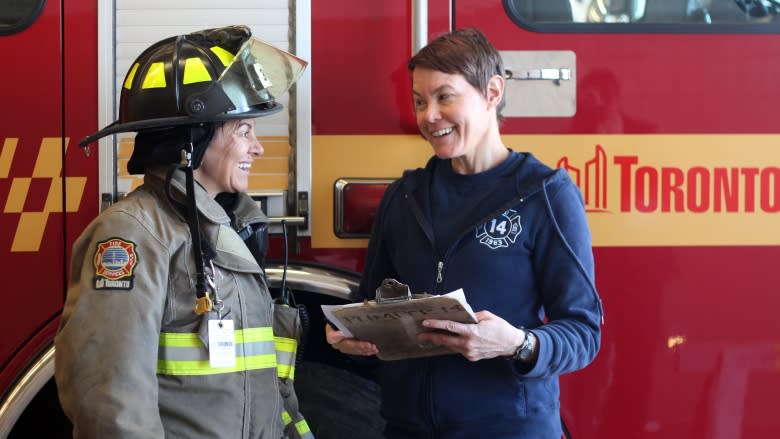4 women discuss challenges they've faced in their work fields
To mark International Women's Day, CBC Toronto spoke with four women who love their jobs.
They discussed some of the challenges they've faced in their industries, how they overcame them and advice they would give to young women interested in their fields.
The photographer
Danielle Da Silva is the CEO of Photographers Without Borders — a non-profit that provides photography and video services for grassroots organizations worldwide.
"I feel so privileged to do what I do. I feel like I am just happy that I get to tell stories that really impact people and places," Da Silva said.
From working in agencies to being on sets, there have been many instances where Da Silva has been the only woman or one of very few women in a room.
"I would definitely call this a male-dominated industry," she said. "If you look at camera brand ambassadors, experts chosen to speak on panels, it's usually men."
Over the years working behind the camera, she's had many experiences that reinforced that notion; often being overlooked as the director on set because people assume it's a man in the room.
"Things like being paid less for the same job, being overlooked for a job, there have been assumptions that I don't know how to use the gear or that I can't handle carrying it," Da Silva said.
She's always willing to act as a mentor to young photographers, and now as a CEO puts the effort to create a safe space in her own workplace by hiring a diverse group of people.
"I think it's very important to promote equitable environments and to maintain these cultures and to call out other toxic cultures and to be a leader," Da Silva said. "I want to show women they can do what they think is impossible."
Da Silva said she's met more women in her field over the last few years and she hopes to see equal representation and equal pay in the industry in the near future.
When asked what she would say to a young woman interested in a career in photography or production, Da Silva replied: "The world needs you now more than ever."
The auto factory manager
Ali Woodley is the plant manager of Honda Canada in Alliston, Ont. In her youth, she had an interest in cars but it wasn't her first career choice.
"My father worked for GM and Ford for over 50 years, so I had some interest," Woodley said.
"The first job was a necessity thing. I needed a job. Then I found it fascinating once I got here."
That was 32 years ago — Woodley now runs the plant that builds 820 Civics a day. She takes care of assembly, paint and welding.
"This is a very high-paced industry. We do a lot of fire fighting, a lot of problem solving," Woodley said.
Throughout her time working in the plant, she's witnessed many changes. The number of women being one of them.
"We have about a 20 per cent female population for the engineering pool, which is really going to be the upcoming management pool when I leave," she said, adding that 30 years ago, that number was certainly lower.
Working in a male-dominated industry never bothered her and she found her coworkers were generally respectful, but Woodley has been questioned by people outside the industry on her position.
"I think people are surprised at first maybe. And if I say I'm a plant manager they go, 'that's kind of shocking.' But I think my family's proud of me so that's good thing."
Woodley believes getting more women in the automotive sector would involve getting females involved in more technology courses in high school. Her advice to young women interested in a career like hers is to talk to women who currently work in the industry.
"You still don't sit back and wait and think, 'oh I'm a woman I don't have this privilege,' she said. "You still fight for the job. You earn the job."
The Carpenter
It started as a childhood dream to build her own home.
Now Charlotte Verge is the site supervisor and lead carpenter at Speed River Contracting.
"What I love most about renovations is variety," Verge said. "It's almost instant gratification. It's you seeing your work as it unfolds."
Education was very important to her family, according to Verge, and she initially studied kinesiology and worked in public health. After three years of feeling like what she was doing wasn't quite the right fit, she went back to school to take the building renovation technician program at George Brown College. She said initially, her family wasn't expecting the career change.
"It was more...confusion in a way. The only person who had done anything along those lines was my grandfather and he had passed away a long time ago," Verge said.
"Now that they see what I can do, I'm a little more impressive to them."
Verge said when she took the program the intake was 160 students, eight of which were women. Five of them graduated.
"Having to deal with being a woman in a male-dominated industry is not everybody's cup of tea," she said.
Verge considers herself lucky, saying she's only had a couple of inappropriate instances in her industry, but most of the problems have come from clients.
"When I started my apprenticeship in Ottawa, a couple of the clients initially asked, 'can you do this? Why are you here?'" Verge takes on the challenge when questioned on her ability.
"You showcase your talent, and then it doesn't become an issue anymore. Just because I'm a woman that's not going to change the end result of your renovation."
Verge now advocates for the trades and has done mentorship programs with Skills Ontario. She's also visited local high schools to talk about her career.
"I just want to advocate for the trades. And if little girls want to participate, sure. I'm on board to chat with them for as long as they want, ask me all the questions you want."
The firefighter
Tamara Sylvan was focused on becoming a professional ballet dancer before firefighting even crossed her mind. She described a day working out at the gym that changed her path.
"A police officer came up to me and said, 'you know Toronto fire is hiring.' And I said, 'oh okay that's good.' And he said, 'no you should go and check it out,'" Sylvan said.
She recalls buying a firefighting exam book that evening and never looking back.
"As soon as I started studying and learning about it, I was hooked," she said.
"Every morning I woke up and said, 'what can I do today that will enable me to be a firefighter?'"
Sylvan has been with the Toronto Fire Service for 17 years. She knew she always enjoyed helping people and now she says she loves the challenge and adrenaline rush of her career.
"Knowing that when a fire truck arrives on scene, no matter if it's for a gas leak or a fire or a medical call, the minute they see the fire truck, everything feels better for the people that we're going to help."
Sylvan said her family was surprised she wanted to be a firefighter because no one else in her family worked in the industry, but they were very supportive.
She said it was mostly people outside her family and colleagues who questioned her ability to pursue the physical career.
"When I was telling people I was aspiring to be a firefighter a lot of people were like, 'you could never carry me out of a burning building,'" she said.
"That actually fired me up to work even harder. I'd go to the gym and work harder. I'd lift heavier. I'm going to prove to these people I can do this."
She's now in the running to become acting captain within the next couple of years. She hopes to see more women get into firefighting, but recognizes that change takes time.
"This has been a traditionally male-dominated career for years and years. So women coming in, it's going to take a while and it's going to take change. But if you love helping people, do it."




